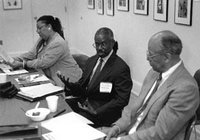CAP: Talent Development

 One of the important findings of the research we conducted in the
One of the important findings of the research we conducted in the The reason that there were no more than only one or two companies in the project came from an unfortunate series of failures in the Jamaican financial sector in the early 1990's. Several companies were taken over by Barbadian and Trinidadian companies in response to tenders that were put out by the government of
At some level, each of the companies was responding to a once-in-a-lifetime opportunity to purchase assets and increase their customer base in a new territory in the region. For each company in the study, there was no well-developed acquisition strategy that they were executing. Instead, they were invited to submit bids, against a particular deadline.
None of the companies involved had a reputation for being facile at executing acquisitions.
Instead, they scrambled to put together their bids and to secure the financial funding and background information to make the deal a reality. This they did successfully, but there were several casualties of this situation that were seen in all the companies studied.
Once the companies were awarded the right to execute the acquisition, they had to face the difficult question of who would lead the new entity. It was as if it was a case of be careful of what you ask for, because you might just get it.
Obviously, continuing with the prior management had its risks, even if the company was one of the few successful ones.
The problem was that there were no spare executives to lead the newly acquired company, and bringing in a new executive to lead the entity seemed to be a recipe for failure. The responses showed this grim reality. In response to the following questions, the responses received were as follows (on a scale of 0/disagree to definitely agree).
- There is a process that will reliably develop managerial talent to ensure the success of future acquisitions -- 50%
- There are sufficient policies to allow easy movement of personnel between current and future subsidiaries -- 47%
- There is sufficient talent for the company to undertake another acquisition successfully -- 59%
(Due to the small size of the sample, and a promise to protect the confidentiality of the companies in the study, I cannot go into the details of specific examples. )
Suffice it to say, each of the companies, upon further investigation, was found to have neither a succession plan nor a management development program when the acquisition was executed.
Furthermore, there was a considerable difference of opinion within some of the companies studied as to the philosophy to be employed in the post-acquisition on the following questions:
- Should the new company be left to develop its own culture, or adopt the culture of the new parent company, which presumably is a more effective one?
- Should the new leadership of the company be from the new country?
- If a temporary executive is used, who should that person be and who should be the replacement?
The truth is, each company was experiencing the consequences of an underinvestment in its senior management development. This effectively prevented the company from undertaking even a single acquisition properly, from the point of view of its leadership.
Labels: M+A


0 Comments:
Post a Comment
<< Home